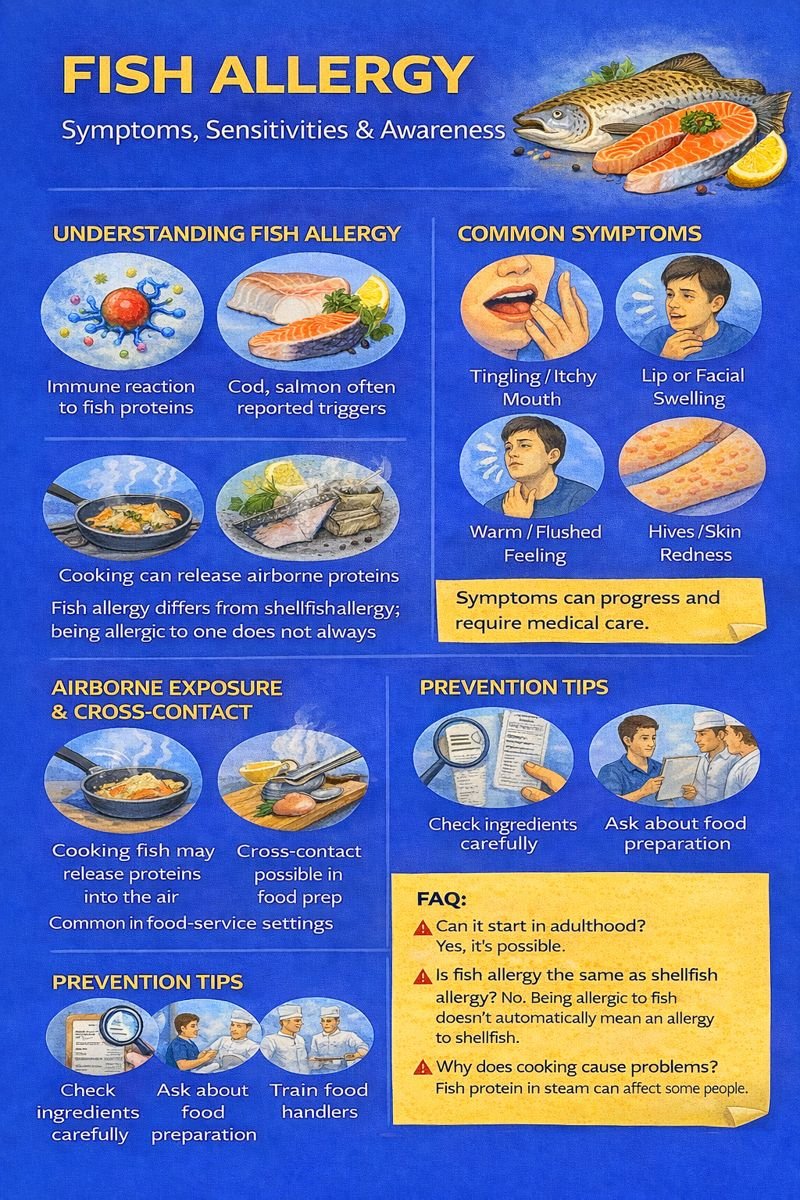Fish Allergy: Symptoms, Sensitivities & Awareness

Public & workplace relevance (Canada)
Fish allergies are important to recognize in food-service settings, cafeterias, camps, and workplaces that prepare or serve food. Cross-contact can occur during cooking or handling, and awareness supports safe food practices and accommodation.
Scenario story
While sharing a seafood meal with colleagues, Sam noticed a tingling sensation in the mouth and lips shortly after eating. Sam stopped eating and reported the symptoms. A co-worker helped check ingredient labels and Sam monitored symptoms at home. Later, a clinician confirmed that seafood proteins could be a trigger for Sam.
Understanding fish allergy
-
Fish allergy involves the immune system reacting to specific proteins
-
Symptoms may begin shortly after eating fish or foods that contain fish
-
Cod and salmon are commonly reported triggers, but reactions vary by individual
-
In some cases, cooking may release airborne proteins in steam or vapour
Fish allergy differs from shellfish allergy; being allergic to one does not always mean being allergic to the other.
Common symptoms
Symptoms can vary widely and may include:
-
Tingling or itching in the mouth
-
Facial or lip swelling
-
Warm sensation or flushing
-
Hives or skin redness
-
Coughing or wheezing
-
Stomach discomfort, nausea, or vomiting
Some people may experience more significant symptoms affecting breathing, blood pressure, or multiple body systems. These reactions are medical emergencies and require urgent care.
Timing of reactions
Symptoms often begin:
-
Within minutes of eating fish
-
Occasionally up to two hours after exposure
Because reactions can progress, individuals with known food allergies often create personal management plans with healthcare professionals.
Airborne exposure & cross-contact
When fish is cooked—especially steamed, boiled, or fried—proteins can become airborne and may trigger symptoms in sensitive individuals. Cross-contact can occur through shared utensils, cutting boards, oils, or work surfaces in food preparation areas.
Food-service environments, cafeterias, childcare programs, and camps may implement prevention strategies to reduce cross-contact and accommodate individual dietary restrictions.
Prevention considerations
-
Ask about preparation methods when dining out
-
Discuss accommodation needs in workplaces or schools when relevant
-
Food handlers should be trained in safe food-prep practices for individuals with food sensitivities
Avoidance strategies vary depending on the person and should be guided by healthcare professionals rather than general advice.
FAQ
Can fish allergy appear later in life?
Yes. Fish allergy is one of the food allergies that may first present in adulthood.
Is fish allergy the same as shellfish allergy?
No. Reactions to one do not automatically mean reactions to the other, although some people react to both.
Can the smell of fish trigger reactions?
It’s usually not the smell itself, but airborne proteins released during cooking that may affect some individuals.
Do all fish cause the same reaction?
Reactions vary. Some people react to one type of fish, while others react to many. Healthcare professionals guide evaluation and testing.
Can people with fish allergy eat canned or processed fish?
Responses vary. Some fish proteins tolerate processing differently, but decisions should be personalized and clinically guided.
Educational note
This article supports public allergy awareness, workplace accommodation and first aid learning and does not replace clinical assessment or personalized medical guidance.
